 Technology
Technology  Technology
Technology  Weird Stuff
Weird Stuff 10 Wild Facts About Taxidermy That You Probably Didn’t Know
 Travel
Travel 10 Beautiful Travel Destinations (That Will Kill You)
 Miscellaneous
Miscellaneous 10 Modern Marriage Rituals Born from Corporate Branding
 Weird Stuff
Weird Stuff Ten Bizarre Visions of 2026 from Fiction
 Weird Stuff
Weird Stuff The 10 Unluckiest Days from Around the World
 Food
Food 10 Modern Delicacies That Started as Poverty Rations
 Movies and TV
Movies and TV 10 Shared TV Universes You’ve Likely Forgotten About
 Weird Stuff
Weird Stuff 10 of History’s Greatest Pranks & Hoaxes
 Miscellaneous
Miscellaneous 10 LEGO Facts That Will Toy with Your Mind
 Technology
Technology 10 Stopgap Technologies That Became Industry Standards
 Weird Stuff
Weird Stuff 10 Wild Facts About Taxidermy That You Probably Didn’t Know
 Travel
Travel 10 Beautiful Travel Destinations (That Will Kill You)
Who's Behind Listverse?

Jamie Frater
Head Editor
Jamie founded Listverse due to an insatiable desire to share fascinating, obscure, and bizarre facts. He has been a guest speaker on numerous national radio and television stations and is a five time published author.
More About Us Miscellaneous
Miscellaneous 10 Modern Marriage Rituals Born from Corporate Branding
 Weird Stuff
Weird Stuff Ten Bizarre Visions of 2026 from Fiction
 Weird Stuff
Weird Stuff The 10 Unluckiest Days from Around the World
 Food
Food 10 Modern Delicacies That Started as Poverty Rations
 Movies and TV
Movies and TV 10 Shared TV Universes You’ve Likely Forgotten About
 Weird Stuff
Weird Stuff 10 of History’s Greatest Pranks & Hoaxes
 Miscellaneous
Miscellaneous 10 LEGO Facts That Will Toy with Your Mind
10 Creepy Reasons Climate Change Is Starting To Look Like A Religion
Since the beginning of Earth’s existence, the climate has changed. It has been influenced by the sun, geological factors, ecological factors, and perhaps even preternatural events (comets, asteroids, and the like).
But recently, largely due to the consequences of the industrial revolution, man’s impact on the climate has come into sharp focus. It is now front and center of all major news outlets and is taken into account—in almost all nations—before new legislation is mooted or passed into law. But after decades of discussion, climate change has recently begun to head in a very unexpected direction . . . toward something resembling a religion.
This list looks at the various elements of climate change (and its advocacy), which most resemble the qualities we find in traditional religions. The aim is not to denigrate or laud the views of either side of the climate discussion (of which both are fervent), but to simply take an objective view of the current state of things.
SEE ALSO: 10 Ways Climate Change Has Affected Us Through History
10 Religious Services & Sacraments
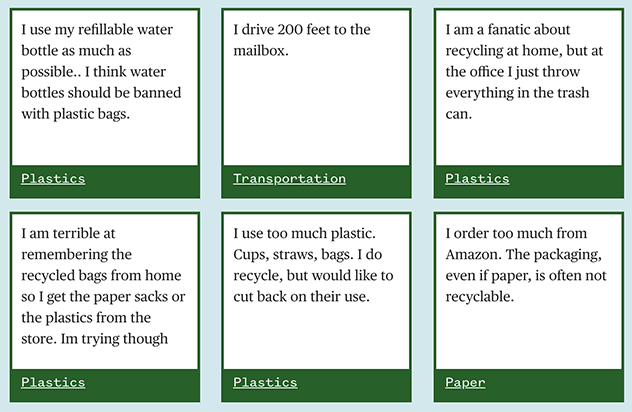
Most religions hold services of some kind. They are, in the most formal Christian sense (as sacraments), designed to impart God’s grace on His followers, and in their most basic sense, designed to give psychological health to adherents. Confession removes the feelings of guilt associated with wrongdoing, and funerals help us begin the steps of coping with the grief and loss of death.
In recent days, some people have begun to advocate for, or participate in, climate change related services for much the same reason. The Prime Minister and Minister for the Environment of Iceland installed a plaque in the presence of 100 mourners for the loss of a 700 year old glacier named Okjökull. This “climate funeral” was also attended by former Irish President Mary Robinson. The Icelandic geologist who had pronounced Okjökull dead in 2014 also attended with a death certificate.[1]
But funerals are not the only climate change sacrament! NBC News recently launched “Climate Confessions” for people to confess their climate sins. The site states: “Even those who care deeply about the planet’s future can slip up now and then. Tell us: Where do you fall short in preventing climate change? Do you blast the A/C? Throw out half your lunch? Grill a steak every week? Share your anonymous confession with NBC News.” The confessions are anonymous and can be viewed by others. Pictured above are a few examples.[2]
9 Evangelism
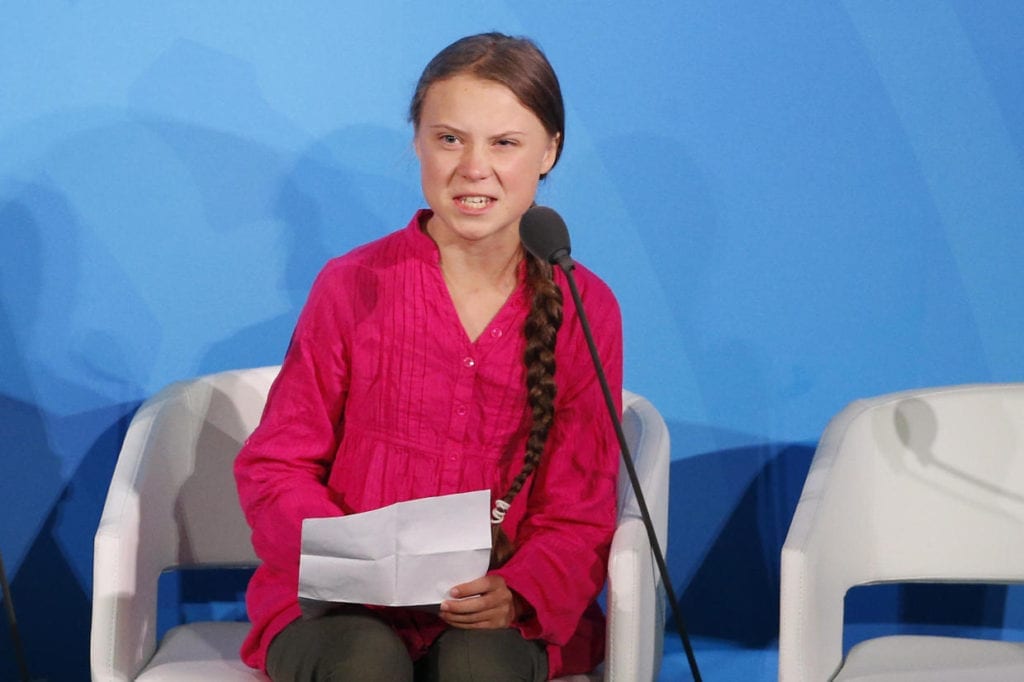
In Roman Catholic parlance, an evangelist is one of the four writers of the New Testament Gospels: Saints Matthew, Mark, Luke, and John. In general use the word refers to someone who preaches at religious services. It is also occasionally used in the technology world to describe someone who strongly advocates for a particular brand or thing.
No faith is complete without its enthusiastic preachers or advocates and climate change is no different. Enter Al Gore, various celebrities, and latterly Greta Thunberg. Thunberg is almost something of a Saint Joan of Arc for the climate change movement in that she is young and passionate—she has even been nominated for a Nobel Peace Prize. Her speech this week to the United Nations illustrates her zeal:
“People are suffering. People are dying and dying ecosystems are collapsing. We are in the beginning of a mass extinction, and all you can talk about is the money and fairy tales of eternal economic growth. How dare you! For more than 30 years the science has been crystal clear. [ . . . ] How dare you. You have stolen my dreams and my childhood with your empty words[.]”[3]
8 Tithing
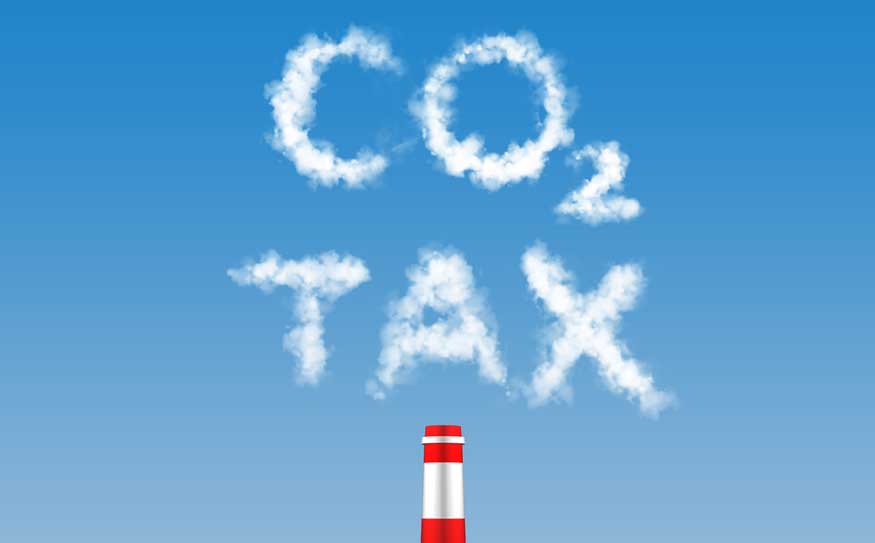
“He commanded also the people that dwelt in Jerusalem, to give to the priests, and the Levites their portion, that they might attend to the law of the Lord. Which when it was noised abroad in the ears of the people, the children of Israel offered in abundance the firstfruits of corn, wine, and oil, and honey: and brought the tithe of all things which the ground bringeth forth.” 2 Paralipomenon 31:4–5
Tithes are like a type of tax—often voluntary—in which members of a religion give a percentage of their income to the religious hierarchy (frequently 10 percent). Governments seldom need arm-twisting to impose new taxes, so it was inevitable that climate change would eventually lead to a whole new class of compulsory tithes. Carbon taxes are being enacted all over the world in the name of climate change. The taxes vary in amount but are not insignificant and are levied in many different ways. For example, in Canada, the carbon tax adds around $0.44 per gallon of gas, increases the cost of coal by 100 percent and increases the price of natural gas by 75 percent.[4]
7 Martyrdom

Martyrdom is death for your faith. The pages of history are doused in the blood of those who have died for their beliefs—real or not. And climate change is no different in this regard. In October 2016, Mark Baumer (a “Climate Activist”) began to walk across the United States barefoot in order to draw attention to climate change and water shortages. He had previous achieved the same feat—albeit fully shod—in 2010.
He kept a prolific diary of his activity and became something of a climate change celebrity as a consequence. Tragically, in January 2017 whilst in the middle of his protest, Baumer was hit by an SUV and killed. Saint Peter died for God . . . Mark Baumer died for climate change. Both are deemed martyrs for their respective causes.[5]
6 Heretics
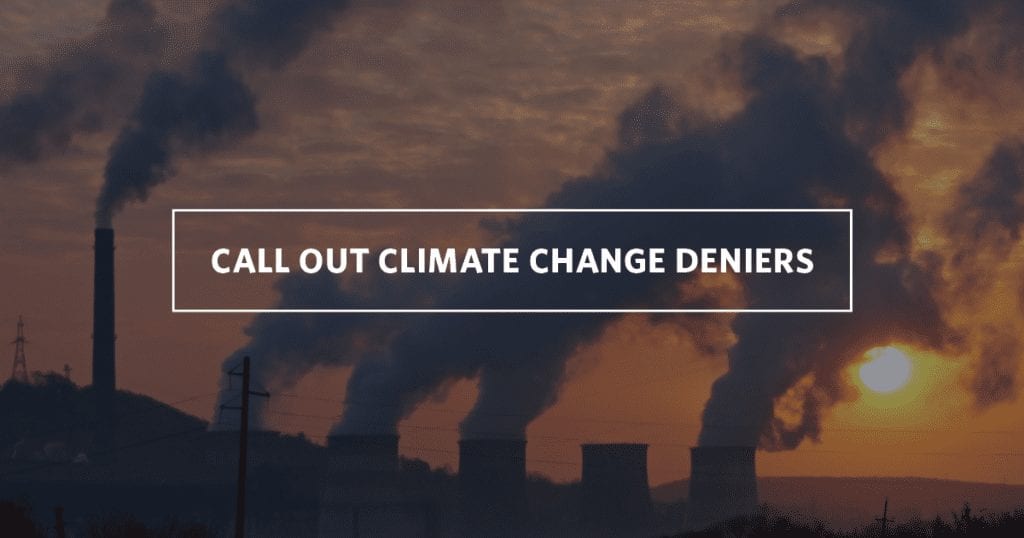
Heresy is the obstinate refusal to accept an established doctrine of a religious faith . . . or denialism. Scientists,[6] professors,[7] and even news reporters[8] have been summarily dismissed from their jobs for disagreeing with the standard views on climate change. They—like heretics in the middle ages—are branded denialists and cut off from their professional communities. There are even name and shame articles on prominent news sites to “out” climate change deniers.[9]
Whether these contrarians are right or wrong matters not . . . it cannot be denied that these excommunications bear a striking parallel to the case of Galileo Galilei who was put under house arrest in the 17th century for stating that heliocentricity proved that the Bible was wrong.
5 Priesthood / Theologians
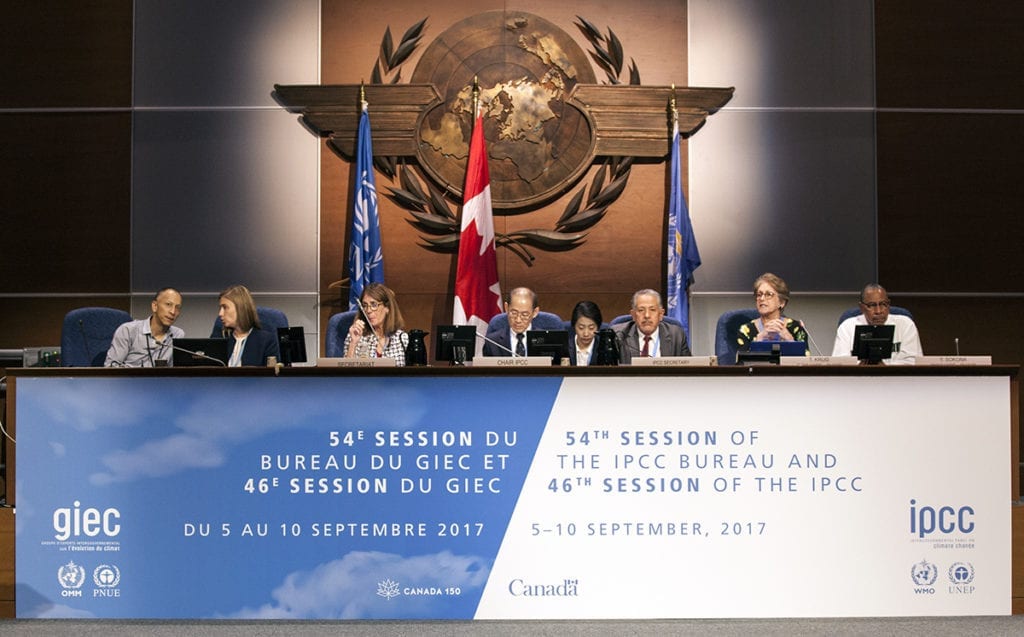
Like priests, bishops, and theologians who read the Scriptures and disseminate their meaning to laymen, the United Nations Intergovernmental Panel On Climate Change takes all of the climate change studies coming out and renders an interpretation for the rest of us. Just as Bishops meet in their synods, the IPCC meets regularly at various places around the world to formulate their pronouncements. World governments use the data produced by this group to direct their environmental policies and taxes.
The panel was formed from the Advisory Group on Greenhouse Gases which was founded in 1985 to study the effects of Greenhouse gas on the environment. Yup . . . politicians have been discussing climate change for over thirty years now.[10] The current head is South Korean Economics Professor Hoesung Lee.
4 Fatwas

In Islamic practice, a fatwa is a decree by a Muslim mufti or lawyer on matters of law. A fatwa can be issued to prohibit certain items from being used or to advocate for particular behaviors. Like a fatwa (which is non-binding), the climate change movement has its own set of rules for objects which are effectively forbidden. Despite being voluntary, refusing to adhere to the bans on these items can lead to public scorn and shame (a method historically used in religion to ensure the maintenance of social mores). And, also like religion, many of these items are now on their way to being banned by law—for example straws and plastic bags, which release greenhouse gasses upon decomposition.[11]
So what happens when you ban certain objects? New objects arise to replace them. Objects that are quite distinctive. That leads us to climate change sacramentals . . .
3 Sacramentals

Sacramentals are manmade objects that are meant to remind the user of the benefits of being pious. In the Catholic religion these appear as rosary beads, scapulas, crucifixes, holy picture cards, and more. For Muslims and Buddhists they are prayer beads. They differ from sacraments in that the sacraments are considered to have come from God rather than man.
For those actively seeking to mitigate the effects of climate change, obvious sacramentals include the likes of re-usable shopping bags, metal or paper straws, re-usable coffee cups, and a variety of other recycled or non-plastic items. Of course these objects do also have uses outside of the environmental movement, but, as the NBC climate confessions show, they are very profoundly important when it comes to climate change.[12]
2 Feast Days
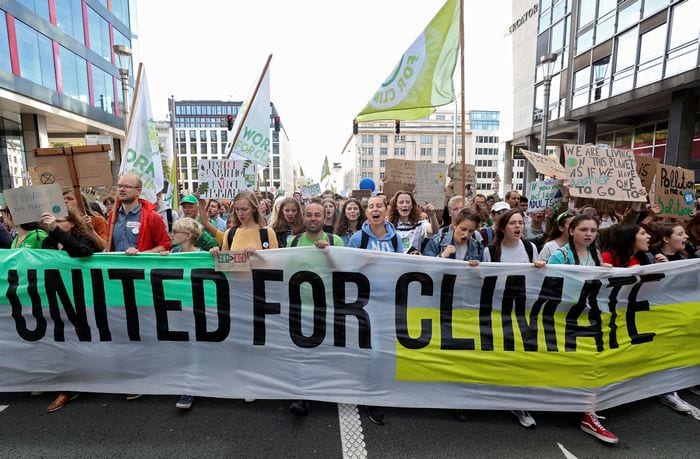
We all love holidays and festivals. Many of our modern ones descend from religion: Christmas, Easter, and Halloween to name but three. In this day and age of anointing days to various causes, it is no surprise to find that climate change has a few of its own feast days. Earth Day (April 22) was first celebrated in 1970 and was obviously not connected to climate change. However it was co-opted by the movement in 2016 when it was chosen as the day to sign the Paris Agreement—a worldwide treaty hoping to ultimately halt global warming.
In 2005, the Global Day of Action was launched. Unlike Earth Day, which is a passive celebration of the Earth, Global Day of Action is a day set aside for active protests. The day was selected to coincide with the United Nations Framework Convention on Climate Change (UNFCCC)—presumably in the hopes of inspiring action at the political level.[13]
1 Eschatology
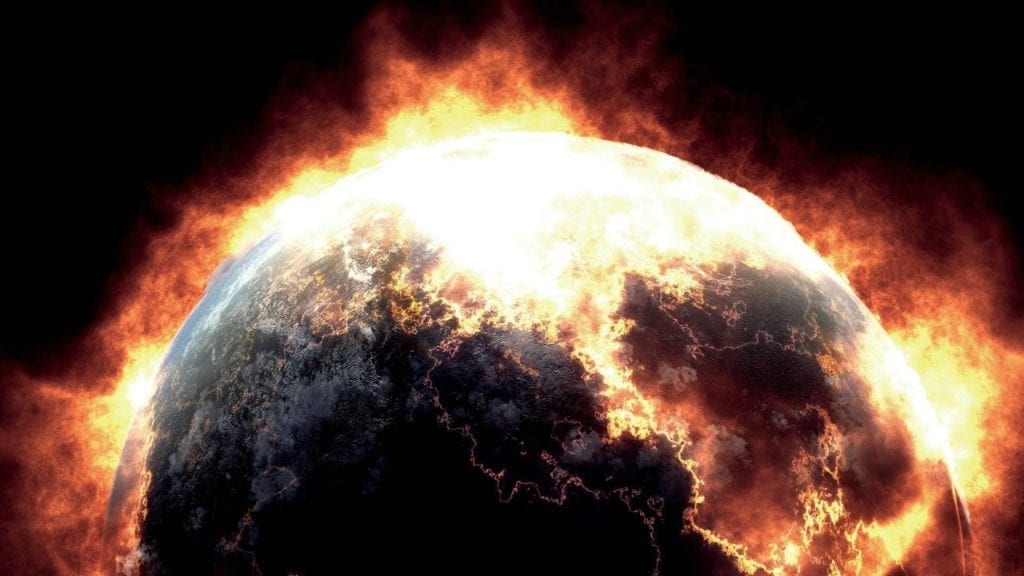
Eschatology is the theological study of the end of times (or of man). Since time immemorial we have foretold (and missed) the end of all civilization. The Jehovah’s Witnesses got their start predicting the exact date of the end of the world. When it failed to occur each time they changed their date, they opted for the now-official position of just stating it will be soon.
But taking over the reigns of the Kingdom Hall religion are a number of climate change advocates who are extremely concerned that the end is nigh. Here are two recent quotes from current sitting US politicians: “The world is gonna end in 12 years if we don’t address climate change [ . . . ],[14] and “The scientists are unanimous on this. We have no more than 12 years to take incredibly bold action on this crisis[.]”[15]
In 2006, Al Gore’s film “An Inconvenient Truth” warned of a ten year period in which to save the world from climate change or it was all over. Of course eschatology doesn’t just take form in religion or politics. Let’s not forget that not so long ago many people were waiting for the end of the world on December 12, 2012.
For more lists on the environment check out 10 Animals That Surprisingly Benefit From Climate Change, and 10 Archaeological Sites Suffering From Climate Change.








